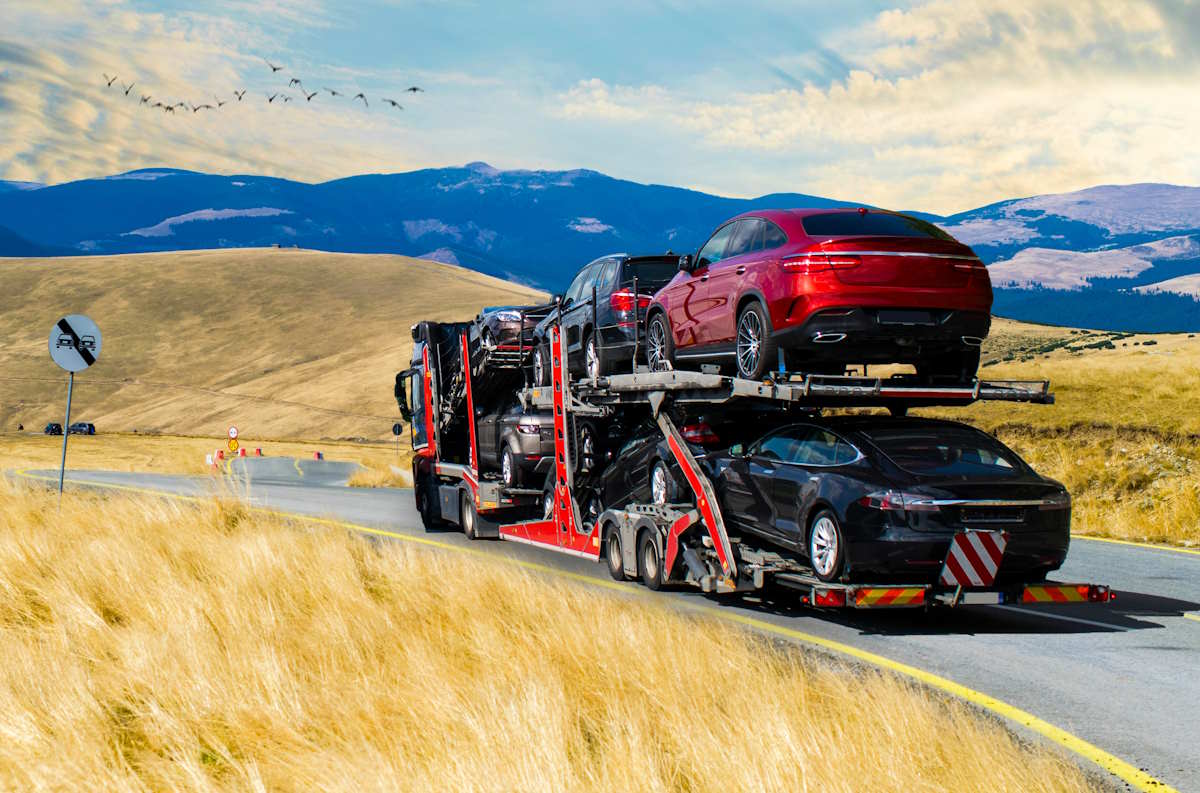How TMS is Revolutionizing the Industry
Trucking has always been a challenging and complex industry. With many tasks and constant change, profit comes from keeping more organized than your competitors. Technology provides a solution in the form of transport management apps.
Car hauling is a remarkably complex sector of the logistics industry. Not only do you need detailed planning and execution, but the weight and exposure of the valuable cargo make the risk and profit much higher than mere boxes. With volume, logistics companies require coordination between various stakeholders, and the supply chain is complex. Some challenges large-scale logistics companies face in car hauling include handling sudden changes in demand, managing capacity constraints, and maintaining a reliable, high-caliber workforce. A specialized solution like Haulk App can make a key difference.
Trucking can be a stressful job, with tight deadlines and high-pressure situations. Software can help alleviate some of this stress by creating a more efficient and organized workflow. Drivers and carriers can focus on what they do best by automating many tasks.
This article will explore how this software is revolutionizing the trucking industry.
Utilizing Technology for Efficient Tracking and Communication
Keeping up with technology gives a solution of efficiency. For tracking and communication, TMS software for carriers have become increasingly sophisticated, with trucking companies now using GPS and other mobile applications to keep track of their vehicles’ whereabouts, prevent theft, and provide real-time updates to customers. A system like Haulk App allows truckers to overcome the challenges of communication and visibility, providing an efficient and user-friendly way to streamline the car-hauling process.
Trucking software provides insightful reports containing data on everything from fuel consumption to driver behavior. This data can be used by carriers to identify areas for improvement, such as driver safety or better fuel efficiency.
Trucking software provides dynamic analysis, allowing drivers and carriers to identify potential problems before they occur. This helps to reduce the risk of delays or issues, ensuring that shipments arrive on time.
Key Features Found in Car Hauling Apps
Simplicity saves time and reduces error. Mistakes are your enemy. With everything streamlined and automated, there’s no need to spend hours on paperwork, phone calls, and emails. One of the most significant benefits of trucking software is that it saves time and effort.
Communication Between Truckers and Carriers
Effective communication is critical when it comes to trucking. With software, truckers and carriers can communicate easily and efficiently in real time. This helps to reduce misunderstandings and allows for better collaboration.
Milestone Notifications for Carriers
Trucking software provides milestone notifications, allowing carriers to stay up-to-date on the progress of shipments. This enables them to be more proactive in case of any potential issues or delays.
Workflow Tracking
Trucking software provides tracking capabilities, allowing drivers and carriers to monitor every aspect of the workflow. This helps to ensure that everything is on track and that adjustments can be made quickly if needed.
Dynamic Analysis
Trucking software provides dynamic analysis, allowing drivers and carriers to identify potential problems before they occur. This helps to reduce the risk of delays or issues, ensuring that shipments arrive on time.
Focus on Cargo Consolidation and Efficient Routing
Efficient routing and cargo consolidation are two key strategies for profitable car hauling. Cargo consolidation involves shipping multiple vehicles to the same location within the same truck. This is a cost-effective approach as it saves fuel and reduces wear and tear on vehicles. Efficient routing, on the other hand, involves finding the shortest and most efficient route possible between the pickup and delivery locations, reducing transportation time, fuel consumption, and cost.
Developing Partnerships and Building Communication Networks
Another effective car-hauling strategy is building partnerships and communication networks with other trucking companies, brokers, and suppliers. By creating a dependable network of partners, businesses can share the costs of transportation and logistics, helping to reduce expenses and increase profits. Engaging partners through simple networking like dealer license plate frames wholesale can open new relationships. Working with reliable partners also creates a sense of security, allowing for a more efficient and streamlined hauling process. Through consistent communication and partnership building, businesses can create an ecosystem of collaboration that benefits all parties involved.
Incorporating Green Logistics
Going green is a trend that has changed the face of numerous industries. Similarly, green logistics involves making environmentally friendly decisions about the products and services used to transport goods. This approach involves reducing emissions, reducing fuel consumption, and using eco-friendly products and services. Green logistics strategies demonstrate a company’s commitment to sustainability and sound environmental practices. Additionally, reducing fuel consumption results in cost savings for the company. In today’s environmentally conscious society, green logistics strategies can serve as a valuable differentiator in the marketplace.
Challenges and Solutions for Small Scale Logistics Companies in Car Hauling
Car hauling is an industry that requires reliable and efficient logistics operations. However, small-scale logistics companies face unique challenges that make it difficult to compete with more significant players in the market. From limited resources to a lack of brand recognition, small logistics companies must be creative and strategic to remain profitable. Here are some solutions to overcome these challenges and build a successful car-hauling business.
Focus on Niche Markets
One way for small-scale logistics companies to compete with larger firms is by carving out a niche market. Instead of trying to do everything, specialize in a specific area of car hauling. For example, focus on transporting luxury, vintage, or electric cars. By targeting a particular segment of the market, a small logistics company can establish itself as the go-to provider for that market and build a loyal customer base.
Automating Operations
Automation is an increasingly popular solution in logistics operations, and small-scale car-hauling companies can benefit from the trend. Automating routine tasks such as scheduling, dispatching, and invoicing can free up time and resources, allowing businesses to focus on more critical tasks such as customer service and business development. Automating also reduces the risk of human error in operations.
Utilizing Social Media and Digital Marketing
In today’s digital age, social media and digital marketing are essential tools for small-scale logistics companies to build brand recognition and attract customers. A well-crafted social media strategy can help businesses build a following, interact with customers, and showcase their expertise in the industry. By investing in digital marketing, small-scale logistics companies can also reach a wider audience and create targeted campaigns that deliver results.
A small logistics company can be compared to a small fish swimming in a vast ocean of larger competitors. By carving out a niche market, automating operations, and utilizing social media and digital marketing, this small fish can thrive and grow into a larger and more profitable enterprise.
Challenges Faced by Large-Scale Logistics Companies in Car Hauling
Car hauling is a complex undertaking that requires careful planning and execution. For large-scale logistics companies, the challenges multiply due to the sheer volume of vehicles to be transported, the coordination required between various stakeholders, and the complexity of the supply chain. Some of the challenges faced by large-scale logistics companies in car hauling include handling sudden changes in demand, managing capacity constraints, and maintaining a reliable, high-caliber workforce.
Focusing on customer-centricity
One of the most effective solutions for large-scale logistics companies in car hauling is to focus on customer centricity. By putting customers at the center of their operations, companies can create a culture of excellence in service delivery. This includes delivering vehicles on demand, adhering to strict timelines, providing accurate tracking information, and tailoring their services to meet customer-specific needs. For example, companies can customize their transport services to cater to VIP customers, who often need extra care and attention.
Maximizing Resources
Maximizing resources is another solution that can help large-scale logistics companies in car hauling. By optimizing their distribution networks, companies can leverage the benefits of efficient routing and logistics consolidation to drive down costs and improve service levels. For example, by consolidating their routes and using advanced technologies to optimize transport efficiency, companies can reduce fuel consumption and lower their carbon footprint.
Building Strong Communication Networks
Making good communication networks is important for doing well in moving cars by truck. Good communication helps everyone know about updates right when they happen. This is for customers, truck drivers, and help teams. Companies should put money into strong communication to share news quick and right. Using GPS to track can help drivers know the traffic and change their way to not be late and make deliveries faster.
Summary of Key Points
Car hauling businesses face a multitude of challenges in their daily operations. From logistical and communication issues to environmental concerns, the industry is continually evolving. However, by adopting specific profitable strategies, they can overcome these challenges and streamline their operations.
Cargo consolidation is a main strategy. Businesses put many cars in one truck to the same place to save fuel. They also save money because the vehicles last longer. Choosing the shortest route is very important. This makes the trip quick and cheap. When companies use cargo consolidation and choose routes well, they keep working and make money. They use technology to track their goods and talk to customers. This helps avoid problems and makes customers happy. Companies work together with others and use green methods. This helps them succeed and look after the Earth.


